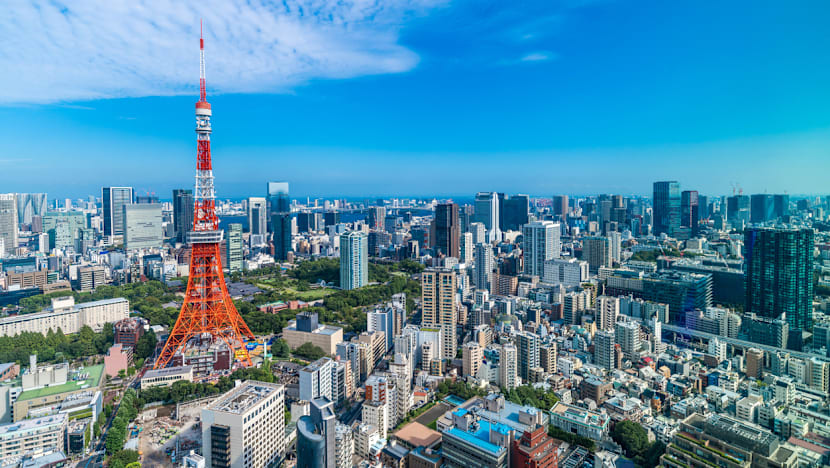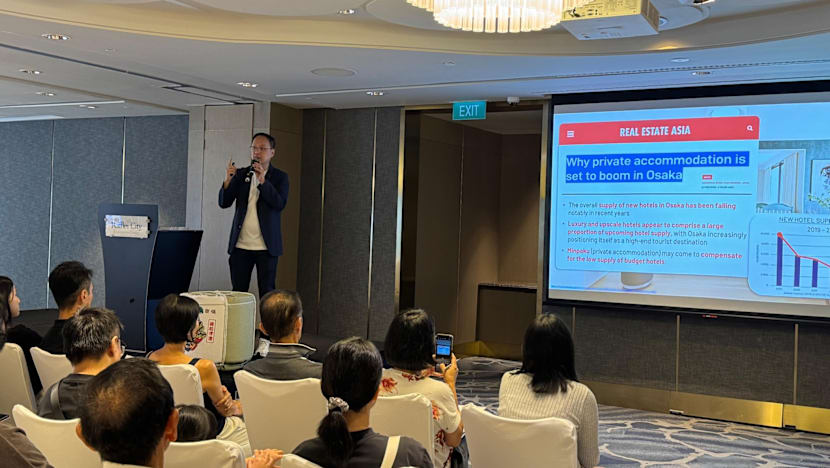Why Singaporeans are snapping up Japanese real estate
At one investment firm, Singaporeans have overtaken Hong Kong investors to become its top buyers of Japanese properties, now accounting for half of all transactions.

An aerial view of Tokyo's urban city skyline. (Photo: iStock)

This audio is generated by an AI tool.
SINGAPORE: A combination of favourable conditions – a weak yen, tourism growth and attractive rental yields – is driving unprecedented Singaporean interest in Japan's property market.
Just a few years ago, FM Investment held sales events in Singapore for Japanese real estate once every couple of months. This year alone, the investment firm has organised at least 15 events for 12 boutique developments across Tokyo, Osaka, Nagoya and Kyoto.
Even more striking is that Singaporeans have displaced Hong Kong investors as the firm's largest buyer group, now accounting for half of all transactions – up from 30 per cent last year.
The numbers tell the story across the industry. Property seminar attendance has risen, with apartments taken up on the spot.
A two-bedroom unit in Tokyo's Asakusa district was sold for under half a million Singapore dollars at OrangeTee's first official Japanese property event last month. Savills Singapore sold out all 60 units of a boutique Osaka development in July, with half going to Singapore-based buyers.
WHAT'S DRIVING THE RUSH
The yen's sustained weakness has significantly enhanced purchasing power for foreign buyers. At current exchange rates, S$1 is worth 117.6 yen – about 12 per cent more than three years ago when Japan reopened its borders to international travellers. For investors, this translates directly into lower acquisition costs and better value per square foot.
Borrowing costs in the country have also stayed low, with its current benchmark rate of 0.5 per cent comparatively lower than most Asian markets.
With new Japan Prime Minister Sanae Takaichi – a proponent of big spending and loose monetary policy – market expectations have further shifted towards a prolonged low interest rate policy, said Mr Hideaki Suzuki, executive director of research consulting at Cushman and Wakefield.
These advantages align with Japan's surging tourism momentum. Visitor numbers continue to break records, driving demand for short-term rental accommodations.
Osaka alone welcomed 14.6 million visitors last year, with the government targeting over 16 million arrivals for this year. The recent World Expo, which concluded in October, brought a massive influx of 27 million domestic and international visitors to the city over six months.
Crucially, Japan continues to be seen as a safe haven for international capital and a place that Singaporeans are familiar with, property players said.
All these have burnished the appeal of Japan versus other property markets, such as Australia and the United Kingdom. Yields in these markets long favoured by Singaporeans may no longer be attractive given higher domestic interest rates, said Realion’s deputy group chief executive Justin Quek.
On top of the confluence of pull factors, there is also a push factor – the additional buyer’s stamp duty in Singapore, which makes ownership of multiple properties prohibitively expensive.
Japan has no restrictions on foreign ownership of real estate, making it attractive to Singaporean investors, said Realion’s group chief executive Desmond Sim.

BEYOND TOKYO
Most Singaporean buyers are hunting for investment properties, particularly short-term rentals catering to tourists, though some are purchasing retirement or holiday homes.
Centrally located apartments are preferred over standalone houses, as they are easier to rent out and manage remotely, according to Ms Chua Shir Yee, head of international sales at PropNex.
While Tokyo remains the dominant destination – particularly prime districts like Roppongi and Shibuya – Osaka is rapidly gaining ground.
The nation's third-largest city in population offers a compelling value proposition: property prices roughly 30 per cent lower than Tokyo, higher rental yields and fewer restrictions on short-term rental operations.
Mr Amous Lee, chief executive of FM Investment, estimates rental yields in Osaka to be around 5 per cent compared with Tokyo's 3 per cent.
"Ginza, Roppongi, Shibuya and Shinjuku will always be trophy assets for investors, especially high net worth individuals, but Singaporeans also look at numbers," he said. "With 3 per cent rental yield in Tokyo, they will turn to somewhere else."
Major infrastructure projects are sweetening the deal. A multibillion-dollar casino resort opening in 2029 is expected to drive tourism numbers even higher. Demand for short-stay accommodations in Osaka has reached "an all-time high", according to Savills Singapore.
Beyond the top-tier cities, investors familiar with Japan are venturing into Nagoya, Fukuoka and Yokohama, seeking even lower entry points into the market, said Ms Chua.
MARKET RESPONSE
Property firms are meeting the demand through partnerships, seminars and curated offerings.
Savills Singapore shifted its focus in Japan from resort investment opportunities to residential properties this year, conducting multiple five-week campaigns that each received around 200 inquiries.
Mr Ruben Koh, head and senior director for international residential sales at Savills Singapore, said that sales were slow initially but began to pick up around June. He attributes this partly to concerns about US tariffs and declining returns on low-risk investments such as fixed deposits.
“Once the fears subsided and interest rates in Singapore started plummeting, investors started to look elsewhere for better yields,” he said.
Realion's real estate agency arm OrangeTee recently announced a partnership with Tokyu Livable, one of Japan’s largest real estate agencies and a shareholder of OrangeTee since 2014.
The collaboration aims to provide a curated portfolio of Japanese residential and investment-grade properties and what Realion calls "premium" renovated apartments – resale units purchased, renovated and offered with 10-year warranties by Tokyu Livable.
“In a lot of very good areas, there's no more land left for sale," said Mr Quek, who is also chief executive of OrangeTee. "So the only access is to get well-located units off the secondary market."

NAVIGATING THE RISKS
Despite the enthusiasm, industry professionals caution that investors must navigate several complexities.
Rules governing short-stay accommodations – known as minpaku – differ across cities and are subject to change. In certain Tokyo districts, private lodgings can only operate on weekends and holidays. Designated special zones like Osaka allow year-round operation, but authorities in September announced plans to suspend applications for year-round private lodgings following resident complaints about rule violations, noise and litter.
The availability of mortgage financing varies by location and may require higher capital outlay. In Nagoya, for example, bank mortgages are only extended for properties in key central districts, with loan-to-value ratios of 50 to 60 per cent compared to 70 per cent in Tokyo and Osaka, said FM Investment's Mr Lee.
Investors should also take into account that while yen weakness enhances purchasing power, it cuts both ways. Continued Singapore dollar strength could mean smaller returns when gains are eventually converted back.
On top of that, investors have to consider their exit strategy, as Japan's resale market operates differently from Singapore's.
Realion's Mr Sim described it as "relatively tepid" given balanced supply and demand dynamics, though he said investors should not face difficulties exiting given the lack of restrictions on property sales to foreigners and a sizable buyer pool from China and Taiwan.
Mr Koh from Savills Singapore said that Japanese properties were "very illiquid" before the pandemic, as people preferred renting during the deflationary era.
“Things have changed a lot due to inflation globally and Japan seems to have pulled itself out of deflation and into inflation,” he added, noting that the resale market has become active for both owner-occupation and investment properties since 2024.
“I would say it is healthy in the big cities and will tend to change hands pretty fast for the smaller-ticket properties.”











.jpg?itok=d-0LVcdP)





